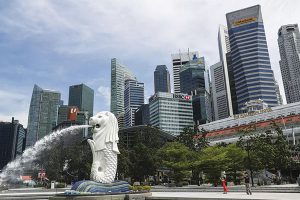Bloomberg
Singapore plans to introduce a points-based visa system for some of its highest-paid foreign workers, including scores for how the applicant’s nationality contributes to the diversity of their firm, in addition to education, skills and pay.
The program unveiled Friday in parliament by Manpower Minister Tan See Leng is among the biggest visa changes ever for a nation that relies heavily on overseas labor across all sectors. It’s similar to moves by other developed economies like the UK in adopting a points-based immigration system.
Including recently announced increases in minimum pay criteria and tightened quotas for some middle-tier jobs, the overhaul underscores how the government of Prime Minister Lee Hsien Loong is seeking to foster local employment and industries, as well as address public concern that international firms favor hiring foreigners.
In addition to factors such as how salaries compare to local peers, education and skills, the new system, known as Compass, will also grant points for whether the nationality of the candidate improves the diversity of their company or if the company is hiring more local staff.
“We remain committed to our goals of upgrading our workforce, comprising a strong Singaporean core, and a high-quality and diverse foreign workforce,†Tan said in parliament. The new guidelines aim “to ensure diversity in our foreign workforce – because a truly open and connected labor market must also be able to draw the best from all around the world,†he added.
The points system will apply to new applicants for an Employment Pass —typically for highly skilled and top salaried workers — from September 2023, and for existing visas renewals from September 2024. So-called EP holders made up about 14% of the country’s nearly 1.2 million foreign workers as of June, according to government data.
The Asian business and trade hub has sought to arrest a drop in the expat population during the pandemic and signal that it continues to be open to foreign talent and investment, as well as meet shortfalls in key growth sectors like technology, biotech and finance.
Unhappiness over foreign labor has been a longstanding issue in Singapore, but perceptions that hiring has been unfair to locals helped lead to the worst electoral showing since independence for the ruling People’s Action Party in 2020.
The government has made efforts to sell the case for why Singapore remains open to foreign labor. Finance Minister Lawrence Wong addressed the issue earlier this week in parliament, saying: “We must never let anti-foreigner sentiments take root here or give the impression that we are becoming more inward looking.â€
“If global investors conclude that this is so, Singapore will become less attractive to them,†Wong said, “and it will be ordinary Singaporeans who suffer the most.â€
The framework will mean the local workforce can be confident foreign professionals are “of a high caliber and will better complement their teams,†Tan said. “And that their employers will also take efforts to develop their local pipeline and to maintain workforce diversity seriously,†he said, adding that most current visa holders will pass the new criteria.
EP applicants in Singapore will need to earn at least 40 points under the new Compass system. In addition to nationality diversity, degrees from a “top-tier institution†or a monthly fixed salary higher than 90% of local peers in their sector will both provide 20 points each, for example.
 The Gulf Time Newspaper One of the finest business newspapers in the UAE brought to you by our professional writers and editors.
The Gulf Time Newspaper One of the finest business newspapers in the UAE brought to you by our professional writers and editors.
